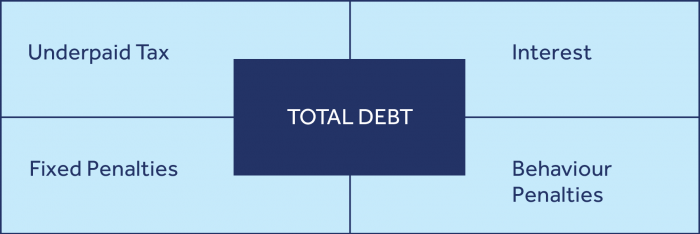Dealing with tax debts in a divorce
Tax On Divorce » August 6, 2020

Tax debts do not go away. There is no statue bar, meaning HMRC can take clients to court for tax debts dating back many years and the debt management team inside HMRC are increasingly able to locate taxpayers using a variety of methods.
The main taxes where the debt attaches to the individual are income tax and capital gains tax. But company debt cannot be ignored as directors of a company can be held personally liable for VAT [Bell & Hovers [2018] TC 06458].
During divorce proceedings, tax debts can create uncertainty around the net value of the assets in the marriage and the debt can literally double once penalties and interest are applied. If the tax debts are not dealt with early on in the case, they could come home to roost in the future once the assets have already been split and the individual has fewer resources from which to settle the liability. Not only will they have less cash but they may not even have access to the documents which they need to help lower their liabilities.
In a divorce where individuals have unmet tax liabilities several things will need to be established,
- How much is the tax debt?
- Will it be considered marital debt or does it attach just to one party?
- Can it be reduced?
- When is it due by?
In the following paragraphs, I’ll take you through each of the above questions and how to work with your client to arrive at accurate responses that can be assessed by a tax adviser.
Quantifying the debt
Quantifying the debt involves a few steps. Firstly, the client should establish if the amount of unpaid tax assessed is correct. Where a tax return has not been filed, HMRC are increasingly making determinations of individuals’ tax liability by estimating the amount of tax they think is due. Calculating the actual amount of tax due will allow the client to understand if the determination is correct or not.
Secondly the client needs to know if the debt actually enforceable; for the debt to be enforceable there must be a formal assessment by HMRC.
Will it be considered marital debt?
This is one for the family law professionals to discuss but as tax advisers we can help to break down the debt.
The debt may be made up of several elements including underpaid tax, determinations, penalties and interest which will all need to be categorised out to understand the mitigation options. Once the debt has been established it will be possible to request a reduction in the behaviour penalties applied.

Part of the process of quantifying the debt will be to also understand how it arose in the first place. Was it due to an incorrect assessment, failure to file or failure to notify HMRC?
For example, we have dealt with many cases in the last 18 months of couples who have failed to declare offshore income in the UK and have since received ‘nudge’ letters from HMRC. The maximum penalty for failure to declare offshore income in the UK is 200% of the tax due.
Reduction of debt
Behaviour Penalties; it is possible to enter into negotiations with HMRC to claim a reduction in the level of penalties. Reductions are given where the individual assists HMRC with their enquiries, this characterised in three ways; telling, helping and giving.
Penalties can also be reduced to nil where a person has a reasonable excuse but this is an extremely difficult test to meet. One taxpayer argued for reduced penalties on the grounds that he was going through a divorce and had little cash to meet his liabilities. The tribunal found that this was not a reasonable excuse and that the taxpayer should have managed his funds better so as to meet his tax liabilities on time… [2018] UKUT 412 (TCC)
Determinations; it may be possible to challenge a determination by submitting a tax return to show the actual income the individual has received. If one is out of time to submit a return then their only recourse is to file a special relief claim to try and reduce the liability.
Interest; Interest is payable from the date the tax liability was due. HMRCs current rate of interest on late payments is 2.75% (you can view historical interest rates here.)
Settling the liability
Once a final payment figure is agreed, if an individual has the cash readily available then they should settle the liability in full to avoid interest accruing. If it’s not possible to immediately settle the liability they have several options available.
Taxpayers can request a Time to Pay Arrangement (TTPA), this arrangement allows an individual to settle the liability by making payments in instalments. The amount of time over which an individual can arrange a TTPA arrangement depends on several factors. HMRC will usually be reluctant to agree longer than 24 months.
Individuals can also accept a charge over their home, this is where they grant HMRC a secondary charge on their home as security.
They can agree to sell an asset in order to raise the funds needed. HMRC will likely pause collection proceedings if a person can demonstrate they are reasonably trying to produce the funds.
High risk clients
Anyone can have hidden tax debts, however from what we see day to day the high-risk areas for clients who may have hidden tax debts are:
- Small business owners, where dividends declared do not match the dividends actually paid and HMRC are issuing penalties for failure to settle an income tax liability
- Couples with overseas income which has not been declared in the UK
- The Tax Ostrich – clients who deliberately ignore all letters from HMRC
- Clients with current HMRC investigations
How can we help?
- We can quantify the debt and work with HMRC to see if there are any reductions possible
- We can work with clients to put in place Time to Pay Arrangements with HMRC
- If there is an open enquiry, we can work with HMRC to try and bring the enquiry to end swiftly and efficiently
If your clients are being chased for debt by HMRC, they can call HMRC and request a pause on the collections. They should absolutely do this if their mental health is being affected by the debt collection. Further taxpayers with additional needs should contact HMRC and ask to speak to the Needs Enhanced Support Service. This is a very special team within HRMC who are trained to work with individuals who need additional support.
